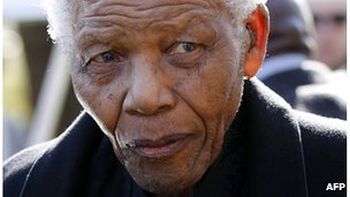
Publisher:
Bonnie King
CONTACT:
Newsroom@Salem-news.com
Advertising:
Adsales@Salem-news.com

~Truth~
~Justice~
~Peace~
TJP
Dec-05-2013 19:10

 TweetFollow @OregonNews
TweetFollow @OregonNews
The Legacy of Nelson Mandela
David Mikhai for Salem-News.com“Apartheid corroded the very essence of life in South Africa,” Mandela wrote. “This is why the country’s emerging political leaders are challenged to build a nation in which all people—irrespective of race, color, creed, religion, or sex—can assert fully their human worth...”
 Nelson Mandela |
(NEW YORK) - Today the world mourns the death of Nelson Mandela, the former president of South Africa and Nobel Peace Prize laureate.
More than twenty years ago, Mandela laid out his vision for the democratic future of his country in the pages of Foreign Affairs.
“Apartheid corroded the very essence of life in South Africa,” he wrote. “This is why the country’s emerging political leaders are challenged to build a nation in which all people—irrespective of race, color, creed, religion, or sex—can assert fully their human worth; after apartheid, our people deserve nothing less than the right to life, liberty and the pursuit of happiness.”
Read his article, “South Africa’s Future Foreign Policy.”
Mandela offered a brief introduction before an audience at CFR in 2005, ahead of a lecture entitled “The African Agenda.”
“I am happy that you have tolerated me to come and appear before you. In fact I’m trembling, although my clothing is covering my movement inside. Because I am used to deception, and because otherwise, if I didn’t adopt deception methods I would not have been here today.”
Read the transcript.
CFR Senior Fellow for Africa Policy Studies John Campbell examines Mandela’s legacy in terms of South African governance and political freedom.
“He insisted on the rule of law. Apartheid may have been a crime against humanity, but there was no extralegal ‘revolutionary justice.’ Instead there was a Truth and Reconciliation Commission under the presidency of Archbishop Desmond Tutu that offered amnesty in return for confession to liberation fighters and members of the apartheid security services. Mandela assiduously observed the new constitution that enshrined the strongest protection of individual and minority rights anywhere in the world. Alone among African states, South Africa permits gay marriage, though much of the population remains homophobic.”
Read the Expert Brief.
CFR Adjunct Senior Fellow for Africa Policy Studies Jendayi Frazer and University of Arkansas professor Valandra in a 2011 op-ed placed Mandela’s political legacy in the context of the “Arab Spring.”
“Voluntarily stepping down from political power in 1999 after serving only one term, Mandela stepped into a more enduring legacy as one of the world’s most respected and influential statesmen. The fall of the Tunisian government and riots against life presidents in Egypt, Yemen, and beyond reveal the continuing relevance of Mandela’s example.”
Read “Celebrating Madiba’s Ninety-Third Birthday.”
In a “Lessons Learned” video on CFR.org last year, CFR Senior Vice President James M. Lindsay discussed the power of Mandela’s achievements.
“It reminds us that people do shape history. People can make a difference. Mandela’s courage and commitment brought the evil system of apartheid to an end, and changed the face of a nation.”
Watch the video here.
SUNY-Albany professor Ryan Irwin writes in a piece published today on
“By cultivating such a pluralist stance toward antiapartheid activism, Mandela’s ANC [African National Congress party] successfully ended the legitimacy of South Africa’s minority white government,” he wrote. “These efforts, however, cultivated unusually high expectations among the supporters who embraced the ANC for reasons as diverse as South Africa itself. The resulting dissonance has made South Africa a paradox: imbued with a rich vocabulary of civil, political, economic, social, and human rights, the country remains plagued by pervasive income inequality, structural unemployment, and widespread poverty.”
Read “Mandela’s Unfinished Business.
More on Nelson Mandela and South Africa from CFR and Foreign Affairs magazine:
“South Africa After Mandela,” a 2011 article in The Atlantic by Campbell
“A Conversation with Jacob Zuma,” a 2008 event with the current president of South Africa
“Strange Bedfellows: Mandela, de Klerk, and the New South Africa,” a 2000 Foreign Affairs review of de Klerk’s book by South African journalist Mark Gevisser
Sincerely,
David Mikhai
Deputy Director, Global Communications and Media Relations
Council on Foreign Relations
58 East 68th Street, New York, New York 10065
Articles for December 4, 2013 | Articles for December 5, 2013 | Articles for December 6, 2013

Salem-News.com:


Quick Links
DINING
Willamette UniversityGoudy Commons Cafe
Dine on the Queen
Willamette Queen Sternwheeler
MUST SEE SALEM
Oregon Capitol ToursCapitol History Gateway
Willamette River Ride
Willamette Queen Sternwheeler
Historic Home Tours:
Deepwood Museum
The Bush House
Gaiety Hollow Garden
AUCTIONS - APPRAISALS
Auction Masters & AppraisalsCONSTRUCTION SERVICES
Roofing and ContractingSheridan, Ore.
ONLINE SHOPPING
Special Occasion DressesAdvertise with Salem-News
Contact:AdSales@Salem-News.com

Terms of Service | Privacy Policy
All comments and messages are approved by people and self promotional links or unacceptable comments are denied.
[Return to Top]
©2026 Salem-News.com. All opinions expressed in this article are those of the author and do not necessarily reflect those of Salem-News.com.